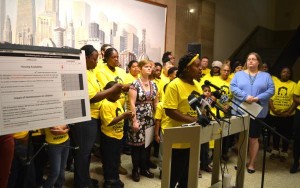By Ellyn Fortino
In light of a new survey detailing the negative impact of homelessness on Chicago children, homeless advocates in the city launched a new campaign Wednesday aimed at improving housing stability and educational supports for families lacking stable homes.

Last school year, there were an estimated 13,054 families in Chicago who experienced homelessness, a number that has tripled over the past 12 years, advocates said at a morning press conference.
“Parents and, most especially, their children, are suffering in Chicago,” said Eithne McMenamin, associate policy director at the Chicago Coalition for the Homeless. “They are suffering the effects of unstable housing and the resulting educational instability.”
The Chicago Coalition for the Homeless is spearheading the new HomeWorks campaign with several partners to push for improved school policies and programs to support homeless Chicago students. The group also wants 500 housing units for families created through the Chicago Low-Income Housing Trust Fund, among other goals.
Homeless advocates launched the Home Works campaign as they released the findings of a survey conducted by the Chicago Coalition for the Homeless over the summer. Among the findings, the survey showed that 46 percent of families were homeless for over a year, and job loss and high housing costs were the most frequently cited causes of homelessness.
Fifty-six percent of the 118 homeless Chicago families with school-aged children that were surveyed said they moved between two or three times over a three-year period, and 20 percent reported living at four to six different residences during that time period.
Meanwhile, 57 percent of parents said their child lacked an adequate study area when they were homeless, and 66 percent reported changes in their child’s behavior at school since losing permanent housing. Of the families surveyed, nearly 33 percent of the children missed six days of school last year and 17 percent missed more than 10 days.
“We are failing the most vulnerable children and families in our city,” McMenamin said. “As they struggle to stabilize their lives, the severe shortage of affordable housing and lack of support services cripple families as they attempt to move out of homelessness and provide stability for their families.”
The survey also found that 24 percent of parents reported negative changes in their children’s grades after becoming homeless and “34 percent of the children have been described as ‘withdrawn’ in school.”
Latoya Ellis, a single parent of three whose family became homeless in August due to a lack of affordable housing, currently lives in a shelter. She spoke to the educational challenges her children, ages 8, 14 and 16, face as a result of their housing status.
“Children need structure and routine, and due to homelessness, I as a parent cannot provide that, because I have no control over certain things like what time the lights go off. My children are often left trying to do their homework by the light of the cellphone, or on the bus on the way to school the next morning or sometimes even in class the next day,” she said. “There are constant distractions that keep them from sleeping and getting a good night’s rest so, as a result, they sleep during class time.”
The Home Works program is a coalition of parents, students, teachers and homeless service providers. Partner groups include the AIDS Foundation of Chicago, Catholic Charities of the Archdiocese of Chicago, Heartland Alliance and others.
“We believe we can end family homelessness,” said Ashley Allen, an education committee leader with the Chicago Coalition for the Homeless. “We are calling on our city and state to create more affordable housing and to support homeless students in their schools. Stable housing plus stable schools creates success for all students.”
